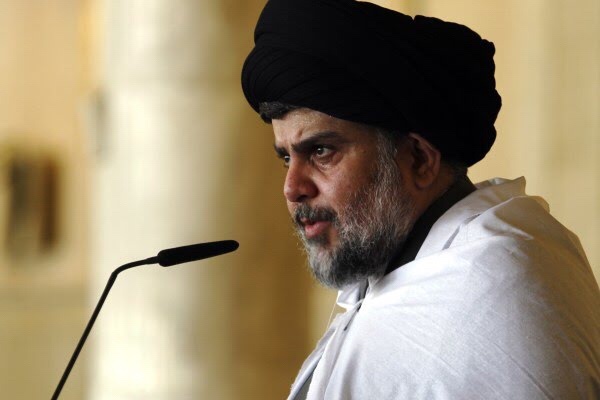
Iraqi Shiite cleric Moqtada al-Sadr.
HAIDAR HAMDANI/AFP/Getty Images
An Election in Baghdad
THE EDITORS
June 27, 2018 9:16 AM
Is anyone paying attention to Iraq?
The Trump administration has its attention fixed on Iran, and there is much to worry over coming out of Tehran. The theocratic regime is funding terrorist organizations across the Middle East, abetting rogue states from Syria to North Korea, abusing its citizens, and almost certainly constructing a deliverable nuclear weapon. But the threats from Iran are no good reason for the Trump administration’s neglect of neighboring Iraq. The administration’s unconcern comes straight from the top: The president came into office proclaiming the Iraq war to have been a mistake and an unqualified disaster, even pretending to have opposed it. His recent triumphalist claim that the United States has rid the region of ISIS gave the strong impression that, with the mission completed, he will have nothing more to do with Iraq.
But Iraq will have plenty more to do with us, whether we like it or not. ISIS has lost territory but remains capable of mounting guerrilla attacks across Iraq, and al-Qaeda is a resurgent presence in both Iraq and war-torn Syria. If the government in Baghdad falls into chaos or collapses altogether—or if Iran’s proxies succeed in turning Iraq into a client state—it’s difficult to see any outcome that doesn’t involve the hegemonic mullahs waging even more aggressive wars against its enemies, who are America’s friends.
Meanwhile, the Iraqi government teeters. On May 19, Moqtada al-Sadr’s Sairoon alliance won 54 of the Iraqi parliament’s 329 seats—the most of any single political faction. Sadr, as readers will remember from the long years of the Iraq war, led a militia called the Mahdi Army that carried out suicide bombings and other attacks against coalition forces. As recently as January 2016, his soldiers kidnapped three American contractors and held them for more tahn a month. He is now one of Iraq’s most popular politician-clerics.
Sadr is being joined by the staunchly pro-Iran Fatah party, led by Hadi al Amiri, which won 47 seats. Western diplomats are sometimes prone to saying they can work with anybody who fought ISIS, as Amiri and his confederates did, but this is not so. The members of Iraq’s Fatah are anti-American fanatics. The faction of Haider al Abadi, whose Victory party controls another 42 seats, has also joined Sadr and Amiri. If Nouri al Maliki follows, as is predicted, Sadr’s coalition will have a parliamentary majority—168 seats—and a devoted enemy of the United States will take control of Iraq’s government.
Turnout was poor in the May election. The results are contested, and a partial recount is underway. On June 10, further reducing confidence in the election results, a ballot-box storage facility housing some half of Baghdad’s ballots caught fire. Abadi claimed foul play. Others, such as Maan alHetawi, the chairman of Iraq’s board of election commissioners, disagreed and argued that “the fire [did] not affect the election results.”
No matter the outcome of that fight, the alliance between Sadr and Amiri confirms the extent of Iran’s influence on Iraqi politics. Amiri once led a fanatically pro-Iranian militant group called the Badr Brigade, and he fought on Iran’s side in the Iran-Iraq War of the 1980s. As recently as 2013 he was openly expressing loyalty to Qassem Soleimani, now the head of Iran’s Revolutionary Guard.
Whereas Amiri is vociferously pro-Iran in public, Sadr has been much less so. He purports to criticize Iran, and his followers in Najaf and elsewhere are keen on demanding that Iran stay out of Iraqi affairs. Yet, in the late 2000s, he was summoned to Iran—to the holy city of Qom, to “study”—and he remains under the spell of Tehran.
Iraq’s future appears bleak. A sometime terrorist is likely to take the premiership, his coalition partners are sympathetic to Iran’s expansionism, and the country is again a breeding ground for both an allegedly vanquished ISIS and a thriving al Qaeda. We hope the State Department is doing what it can to prevent Baghdad’s rapprochement with Tehran—furthering the cause of Kurdish independence comes to mind. If Iraq fails, America’s enemies in the Middle East will have doubled or tripled their strength.
Donald Trump may wish to ignore Iraq. But if the president believes his own rhetoric about the threats from Iran, and if he’s serious about defeating jihadists in the region, he’d be wise to resist that temptation.
No comments:
Post a Comment